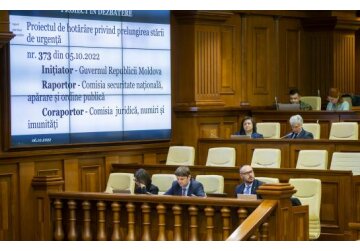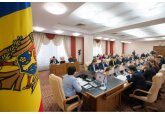
The Parliament decided to extend the state of emergency throughout Moldova for 60 days, starting from October 7.
In particular, the relevant resolution was adopted at the plenary session on Thursday by the votes of 53 deputies from the ruling PAS party, at the suggestion of the government. The need to extend the state of emergency in Moldova was due to the ongoing risks and threats related to national security, as well as the need to provide Moldova with energy resources during the cold season. Presenting the draft decision, Prime Minister Natalia Gavrilita noted that the state of emergency is a necessary tool to protect people and the national economy during this difficult period for Moldova, the region and the whole world. Among the main threats that our country may face in the near future, the government calls the restriction or even cessation of energy supplies and rising prices for them, the escalation of the situation in the war-torn territories and the approach of hostilities to the borders of Moldova, the use of nuclear weapons with regional and global consequences, an increase in the flow of refugees from Ukraine, as well as the consequences caused by the partial mobilization announced in Russia. The state of emergency will allow the Commission for Emergency Situations to continue to take swift action to overcome multiple crises. According to the resolution approved by the parliament, during the period of the state of emergency, the Commission for Emergency Situations (CoES) makes binding decisions for the heads of central and local public administration bodies, economic entities, state institutions, as well as for citizens of Moldova and other persons on the territory of our country. It should be noted that the state of emergency in Moldova for a period of 60 days was introduced by the decision of the parliament on February 24 due to the outbreak of the war in Ukraine and threats to the security of Moldova. Subsequently, the parliament extended the state of emergency several times: from April 25 - for 60 days, from June 24 - for 45 days, and from August 8 - for another 60 days. As Natalia Gavrilita noted, during this period, the actions of the government and the CoES did not go beyond the mandate given by the parliament. The government and the commission acted transparently, derogations from the legal framework were proportionate and necessary to manage and overcome the emergency.// 06.10.2022 — InfoMarket







